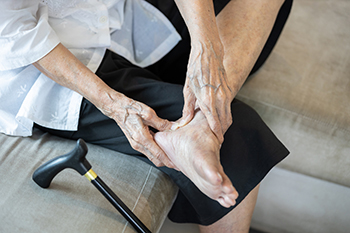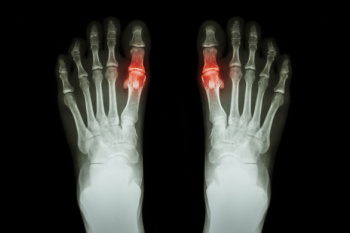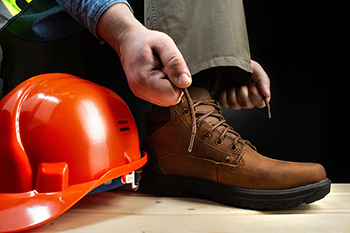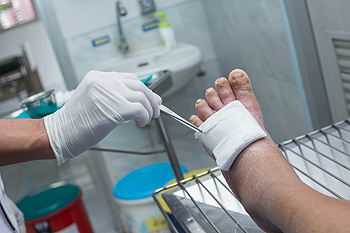Items filtered by date: February 2024
Addressing Challenges in Foot Care Among Older Adults

As individuals age, the importance of proper foot care becomes increasingly evident. However, older people often face unique challenges in maintaining good foot health. Reduced mobility and flexibility can make it difficult for seniors to attend to their feet regularly. Conditions such as arthritis can further impede their ability to perform basic foot care tasks like trimming nails or inspecting for cuts and sores. Additionally, age-related changes in skin and circulation increase the risk of developing foot problems such as corns, calluses, and infections. Furthermore, chronic health conditions like diabetes can exacerbate these issues, as diabetic neuropathy may diminish sensation in the feet, making it harder to feel injuries or wounds. Lack of awareness about the importance of foot care and its relationship to overall health also contributes to neglect in this area. If you or a loved one is elderly, it is suggested that an appointment with a podiatrist is scheduled who can provide you with effective foot care tips and treatment.
If you need your feet checked, contact Dr. John Branwell of Kearny, New Jersey. Our doctor will attend to all of your foot and ankle needs and provide you with quality treatment.
Geriatrics and Podiatry
When people age, some common issues that may occur are bone density loss, dry skin, poor circulation, and rough brittle nails. These issues may also affect your foot health if the necessary steps are not taken to alleviate the problems.
It is important to take care of your feet because feet that are injured or diseased can affect your overall health. Having painful feet hinders your ability to do daily activities or may decrease your willingness to do the things that you need to do.
Visiting Your Geriatrician
As we age, health problems become more likely, so it is essential to visit your doctor for check-ups to ensure that you are doing the best you can to take care of your health. It is recommended to check your feet frequently for any possible cuts, bruises, swelling, corns or any other irregularities.
Taking Care of Elderly Feet
Cracked or dry feet can be treated by applying moisturizer often. It is also important not to wear old socks because the older the sock is, the higher the possibility there will be that there is bacteria there. Wear fresh socks and make sure they fit properly.
Proper foot health means that you can have a more active lifestyle and you will not be bogged down by pain. Foot health also leads to good circulation, which is paramount for overall health.
If you have any questions, please feel free to contact our office located in Kearny, NJ . We offer the newest diagnostic tools and technology to treat your foot and ankle needs.
Joint Pain From Gout

If you are concerned about gout, be aware of specific symptoms indicating a potential flare-up. Elevated uric acid or purine levels in routine blood tests may signal its presence. Gout typically manifests as intense joint pain, often at night, with a common target being the big toe joint. Inflammation accompanies the pain, leading to swelling, tenderness, warmth, and redness in the affected area. The initial hours of a flare-up can be excruciating, making it difficult to walk or touch the foot. Although flares typically last approximately 12 hours, joint discomfort can persist for days to weeks afterward. If you experience symptoms like big toe pain, consulting a podiatrist is suggested for diagnosis and treatment. This foot doctor can assess any potential joint damage from gout and provide appropriate care to manage symptoms effectively.
Gout is a foot condition that requires certain treatment and care. If you are seeking treatment, contact Dr. John Branwell from Kearny, New Jersey. Our doctor will treat your foot and ankle needs.
What Is Gout?
Gout is a type of arthritis caused by a buildup of uric acid in the bloodstream. It often develops in the foot, especially the big toe area, although it can manifest in other parts of the body as well. Gout can make walking and standing very painful and is especially common in diabetics and the obese.
People typically get gout because of a poor diet. Genetic predisposition is also a factor. The children of parents who have had gout frequently have a chance of developing it themselves.
Gout can easily be identified by redness and inflammation of the big toe and the surrounding areas of the foot. Other symptoms include extreme fatigue, joint pain, and running high fevers. Sometimes corticosteroid drugs can be prescribed to treat gout, but the best way to combat this disease is to get more exercise and eat a better diet.
If you have any questions please feel free to contact our office located in Kearny, NJ . We offer the newest diagnostic and treatment technologies for all your foot and ankle needs.
Choosing the Right Footwear for Construction and Outdoor Work

Working in construction or outdoor settings demands footwear that prioritizes safety, durability, and comfort. Choose work boots specifically designed for these environments, featuring steel toe caps to protect against heavy objects and impact. Look for boots with sturdy outsoles that offer traction on uneven terrain, reducing the risk of slips and falls. Waterproof or water-resistant materials are essential to keep feet dry and comfortable, especially when working in wet or muddy conditions. Additionally, choose boots with ample ankle support to prevent strains and injuries while navigating uneven ground or climbing ladders. Breathable linings and moisture-wicking properties help regulate temperature and reduce sweat buildup, enhancing overall comfort during long hours of work. Consider factors such as insulation for cold weather conditions or ventilation for hot climates to ensure year-round suitability. Investing in high-quality, well-fitted work boots is not only critical for safety but also for maintaining productivity and minimizing the risk of foot-related injuries in demanding work environments. If you have questions about what type of shoes to wear during your workday, it is suggested that you confer with a podiatrist who can guide you toward making the correct choices.
While working on the feet, it is important to take the proper care of them. For more information about working on your feet, contact Dr. John Branwell from Kearny, New Jersey. Our doctor will treat your foot and ankle needs.
Working on Your Feet
Standing on your feet for long periods of time can cause stress and pain in your feet. Your whole body may experience change in terms of posture, back pain, bunions, callouses and or plantar warts. There are ways to avoid these conditions with proper foot care, smart choices and correct posture.
Positive Changes
Negative heeled shoe – Choosing this shoe type places the heel slightly lower than the ball of the foot. These are great for overall foot health. Find shoes that fit you correctly.
Go barefoot – Our feet were not designed to be enclosed for all hours of the day. Try to periodically expose your feet to air.
Eliminate Pain
Foot Exercises – Performing simple exercises, incorporating yoga and doing stretches are beneficial. This will allow increased blood flow to the area and muscles of the foot.
Achilles tendon – Stretching the foot out flat on the floor will relax the calf muscles and tendon. These exercises can be performed almost anywhere. Make sure you add these exercises to your daily regimen.
With a little bit of this information and knowing more about foot health, you will notice changes. Foot stretches and proper footwear will help with pain and prevent further issues.
If you have any questions please feel free to contact our office located in Kearny, NJ . We offer the newest diagnostic and treatment technologies for all your foot and ankle needs.
It's Time for Beautiful Feet
Diabetic Ulcers and Wound Care

Diabetic foot ulcers are a severe problem for people with diabetes and can lead to serious health issues, such as amputations. To treat diabetic foot ulcers, podiatrists typically use methods like cleaning the wound, using special dressings, taking care of the patient's overall health, and checking blood vessels. There is ongoing research that explores additional treatments to speed up healing and reduce the need for amputations. These extra treatments include things like specific types of dressings, oxygen therapy, and growth factors. More research is needed to confirm their effectiveness. If you suffer from diabetic foot ulcers, it is strongly suggested that you are under the care of a podiatrist who can perform regular foot exams. Treating these types of ulcers as early as possible is essential to an easier healing process.
Wound care is an important part in dealing with diabetes. If you have diabetes and a foot wound or would like more information about wound care for diabetics, consult with Dr. John Branwell from Kearny, New Jersey. Our doctor will assess your condition and provide you with quality foot and ankle treatment.
What Is Wound Care?
Wound care is the practice of taking proper care of a wound. This can range from the smallest to the largest of wounds. While everyone can benefit from proper wound care, it is much more important for diabetics. Diabetics often suffer from poor blood circulation which causes wounds to heal much slower than they would in a non-diabetic.
What Is the Importance of Wound Care?
While it may not seem apparent with small ulcers on the foot, for diabetics, any size ulcer can become infected. Diabetics often also suffer from neuropathy, or nerve loss. This means they might not even feel when they have an ulcer on their foot. If the wound becomes severely infected, amputation may be necessary. Therefore, it is of the upmost importance to properly care for any and all foot wounds.
How to Care for Wounds
The best way to care for foot wounds is to prevent them. For diabetics, this means daily inspections of the feet for any signs of abnormalities or ulcers. It is also recommended to see a podiatrist several times a year for a foot inspection. If you do have an ulcer, run the wound under water to clear dirt from the wound; then apply antibiotic ointment to the wound and cover with a bandage. Bandages should be changed daily and keeping pressure off the wound is smart. It is advised to see a podiatrist, who can keep an eye on it.
If you have any questions, please feel free to contact our office located in Kearny, NJ . We offer the newest diagnostic and treatment technologies for all your foot care needs.

